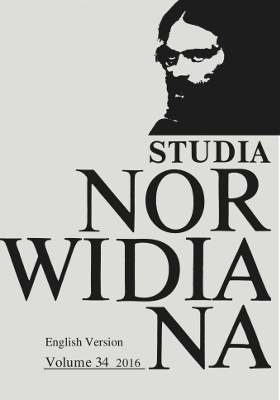An outline of anthropology of culture in Norwid’s oeuvre
An outline of anthropology of culture in Norwid’s oeuvre
Author(s): Michał MasłowskiSubject(s): Language and Literature Studies, Studies of Literature, Polish Literature
Published by: Towarzystwo Naukowe KUL & Katolicki Uniwersytet Lubelski Jana Pawła II
Keywords: anthropology; gesture; work; interaction; messianic nature of work; self-transcendence
Summary/Abstract: Norwid’s reliance on gestures, behaviours and interactions in his poetry unveils the anthropological foundations of his line of thought. These foundations enable our understanding of his working philosophy, words and letters. Interactions make part of his discourse infrastructure, as defined in behavioural research, which developed no sooner than the 1950s and the 1960 (e.g. Lorenz, Goffman, Hall, Berne or Turner). Applying these categories to analyse Norwid’s Promethidion (1850) and Rzecz o wolnosci słowa [On the freedom of the Word] (1869) as well as such other poems like Fatum or Rozebrana [Partitioned] helps us observe how humanity emerges out of amazement – that how consciousness and the experience of work undergo sublimation to turn into the word. At the advent of Christ, the Word became power, which resulted in ethical universalism and in the realization of the messianic nature of work, guiding us towards resurrection (self-transcendence). Norwid’s thought, situating the metaphysical sense within the realm of anthropology, hugely influenced the theology of John Paul II.
Journal: Studia Norwidiana
- Issue Year: 2016
- Issue No: 34EV
- Page Range: 5-22
- Page Count: 18
- Language: English

